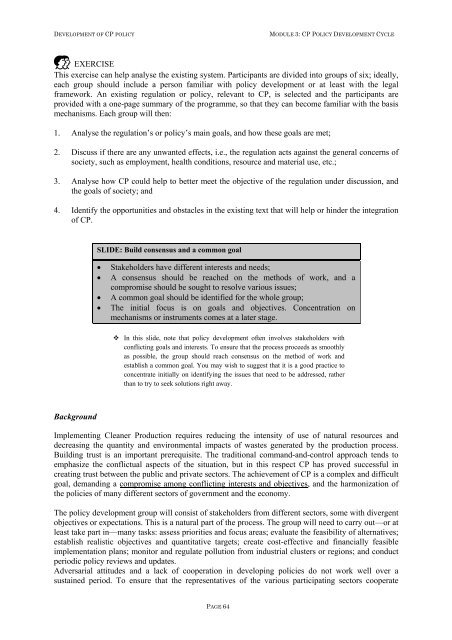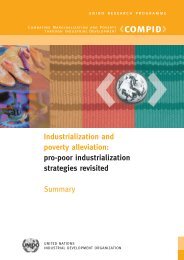Manual on the Development of Cleaner Production Policies ... - Unido
Manual on the Development of Cleaner Production Policies ... - Unido
Manual on the Development of Cleaner Production Policies ... - Unido
You also want an ePaper? Increase the reach of your titles
YUMPU automatically turns print PDFs into web optimized ePapers that Google loves.
DEVELOPMENT OF CP POLICY<br />
MODULE 3: CP POLICY DEVELOPMENT CYCLE<br />
EXERCISE<br />
This exercise can help analyse <strong>the</strong> existing system. Participants are divided into groups <strong>of</strong> six; ideally,<br />
each group should include a pers<strong>on</strong> familiar with policy development or at least with <strong>the</strong> legal<br />
framework. An existing regulati<strong>on</strong> or policy, relevant to CP, is selected and <strong>the</strong> participants are<br />
provided with a <strong>on</strong>e-page summary <strong>of</strong> <strong>the</strong> programme, so that <strong>the</strong>y can become familiar with <strong>the</strong> basis<br />
mechanisms. Each group will <strong>the</strong>n:<br />
1. Analyse <strong>the</strong> regulati<strong>on</strong>’s or policy’s main goals, and how <strong>the</strong>se goals are met;<br />
2. Discuss if <strong>the</strong>re are any unwanted effects, i.e., <strong>the</strong> regulati<strong>on</strong> acts against <strong>the</strong> general c<strong>on</strong>cerns <strong>of</strong><br />
society, such as employment, health c<strong>on</strong>diti<strong>on</strong>s, resource and material use, etc.;<br />
3. Analyse how CP could help to better meet <strong>the</strong> objective <strong>of</strong> <strong>the</strong> regulati<strong>on</strong> under discussi<strong>on</strong>, and<br />
<strong>the</strong> goals <strong>of</strong> society; and<br />
4. Identify <strong>the</strong> opportunities and obstacles in <strong>the</strong> existing text that will help or hinder <strong>the</strong> integrati<strong>on</strong><br />
<strong>of</strong> CP.<br />
SLIDE: Build c<strong>on</strong>sensus and a comm<strong>on</strong> goal<br />
• Stakeholders have different interests and needs;<br />
• A c<strong>on</strong>sensus should be reached <strong>on</strong> <strong>the</strong> methods <strong>of</strong> work, and a<br />
compromise should be sought to resolve various issues;<br />
• A comm<strong>on</strong> goal should be identified for <strong>the</strong> whole group;<br />
• The initial focus is <strong>on</strong> goals and objectives. C<strong>on</strong>centrati<strong>on</strong> <strong>on</strong><br />
mechanisms or instruments comes at a later stage.<br />
In this slide, note that policy development <strong>of</strong>ten involves stakeholders with<br />
c<strong>on</strong>flicting goals and interests. To ensure that <strong>the</strong> process proceeds as smoothly<br />
as possible, <strong>the</strong> group should reach c<strong>on</strong>sensus <strong>on</strong> <strong>the</strong> method <strong>of</strong> work and<br />
establish a comm<strong>on</strong> goal. You may wish to suggest that it is a good practice to<br />
c<strong>on</strong>centrate initially <strong>on</strong> identifying <strong>the</strong> issues that need to be addressed, ra<strong>the</strong>r<br />
than to try to seek soluti<strong>on</strong>s right away.<br />
Background<br />
Implementing <strong>Cleaner</strong> Producti<strong>on</strong> requires reducing <strong>the</strong> intensity <strong>of</strong> use <strong>of</strong> natural resources and<br />
decreasing <strong>the</strong> quantity and envir<strong>on</strong>mental impacts <strong>of</strong> wastes generated by <strong>the</strong> producti<strong>on</strong> process.<br />
Building trust is an important prerequisite. The traditi<strong>on</strong>al command-and-c<strong>on</strong>trol approach tends to<br />
emphasize <strong>the</strong> c<strong>on</strong>flictual aspects <strong>of</strong> <strong>the</strong> situati<strong>on</strong>, but in this respect CP has proved successful in<br />
creating trust between <strong>the</strong> public and private sectors. The achievement <strong>of</strong> CP is a complex and difficult<br />
goal, demanding a compromise am<strong>on</strong>g c<strong>on</strong>flicting interests and objectives, and <strong>the</strong> harm<strong>on</strong>izati<strong>on</strong> <strong>of</strong><br />
<strong>the</strong> policies <strong>of</strong> many different sectors <strong>of</strong> government and <strong>the</strong> ec<strong>on</strong>omy.<br />
The policy development group will c<strong>on</strong>sist <strong>of</strong> stakeholders from different sectors, some with divergent<br />
objectives or expectati<strong>on</strong>s. This is a natural part <strong>of</strong> <strong>the</strong> process. The group will need to carry out—or at<br />
least take part in—many tasks: assess priorities and focus areas; evaluate <strong>the</strong> feasibility <strong>of</strong> alternatives;<br />
establish realistic objectives and quantitative targets; create cost-effective and financially feasible<br />
implementati<strong>on</strong> plans; m<strong>on</strong>itor and regulate polluti<strong>on</strong> from industrial clusters or regi<strong>on</strong>s; and c<strong>on</strong>duct<br />
periodic policy reviews and updates.<br />
Adversarial attitudes and a lack <strong>of</strong> cooperati<strong>on</strong> in developing policies do not work well over a<br />
sustained period. To ensure that <strong>the</strong> representatives <strong>of</strong> <strong>the</strong> various participating sectors cooperate<br />
PAGE 64
















